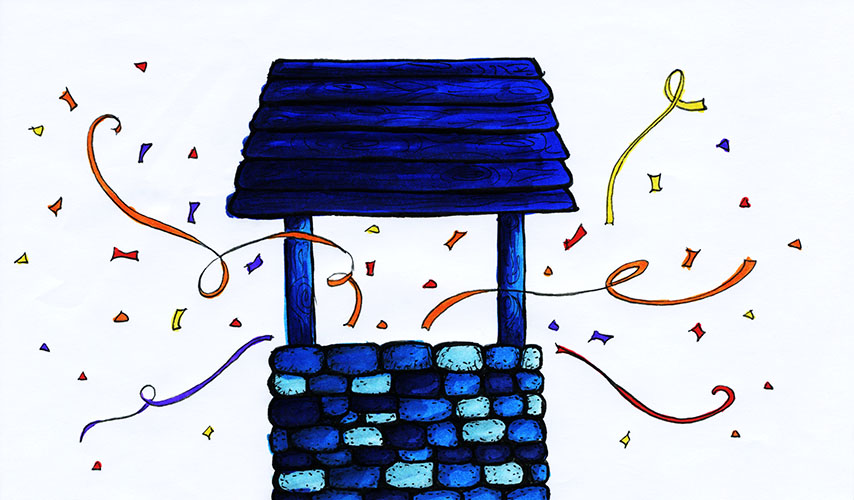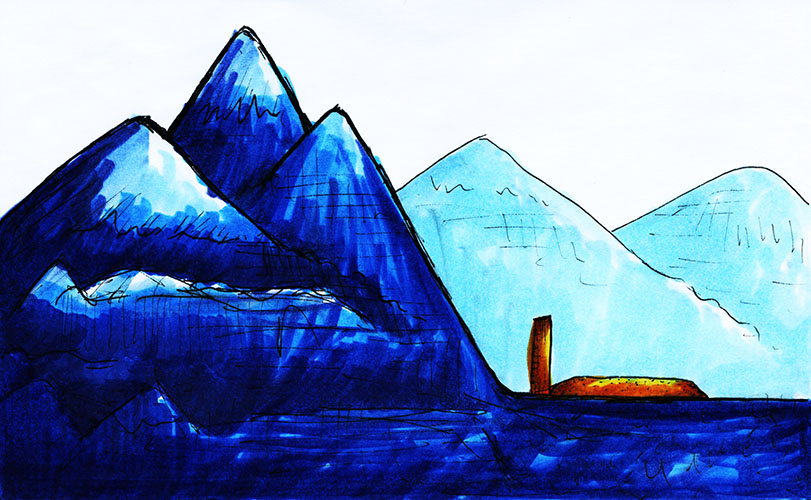It didn’t happen all at once. I didn’t wake up one morning to find myself unable to write creatively. For months, I could eke out a story or group of poems, but all attempts at another novel arrived stillborn, exhausting themselves after a few thousand words. My father suggested I had a form of postpartum depression, that seeing my first novel in print, and therefore out of my hands, was too much of a shock, temporarily. I didn’t have the heart to tell him this had been going on for years.
I finished a decent draft of my novel in 2015, made revisions based on a publisher’s interest in 2017, and sold it to him later that year. The editorial process spanned 18 months, but I had plenty of downtime between rounds of edits to work on something new. A colleague inquired about just this at one point, mentioning, “I hear you’re supposed to have a draft of the next thing by the time the previous book comes out.” I smiled, nodded, and assured him I was on my way.
That year, I even tried NaNoWriMo.
Soon, the stories dried up, followed by the poems within a semester. I took an online “poetry salon,” recycling work I’d set aside for the lean months. For a flash-fiction workshop, I generated a few thousand words, most of them rescued from earlier failures. After spending 500 dollars on these two courses, I had yet to spur myself into action. By the time the first box of copies of my novel arrived, the climate in my mind had grown hostile to new growth.
Around this time, I reread my copy of Richard Ford’s “Goofing Off While the Muse Recharges,” which I’d discovered almost 20 years earlier and had used as cover to justify periods of inactivity in graduate school. Bemused by his friends’ discomfort with fallow periods, Ford crows, “I have made a strict point to take lavish periods away from writing.” He defends his choice by arguing that “I’ve never thought of myself as a man driven to write. I simply choose to do it, often when I can’t be persuaded to do anything else.” Even as an MFA student with limited experience with Ford’s oeuvre, I didn’t buy this. I knew he wasn’t Simenon, Balzac, or Stephen King, but he couldn’t create Frank Bascombe as a diversion between baseball seasons. Later in the essay, he quotes Henry James’s admonition that one must fill one’s “well of unconscious cerebration,” though I doubt the famously-prolific James did so by taking off as much time as Ford does.

I do feel an affinity for the Ford I encountered late in the essay, when he drops the pose of the occasional novelist long enough to admit, “in the case of writing novels, one endeavor consumes almost entirely its own resources and generally leaves its author emptied, dazed and bewildered with a ringing in his ears.” Here, he acknowledges the toll writing takes on the writer, the way novelists, in particular, can find themselves burnt out at the end of a project that can occupy years of their lives. However, a ringing that went on not for a baseball season or so but for four years seems too dire even for this.
The publication process hasn’t helped. Someone who read my novel as soon as it came out tried to commiserate with me when I confessed my frustrations by saying, “given a chance, people will always disappoint you.” This has been the case more often than I would like to admit. Some of those I’d given advanced copies to, out of friendship and gratitude for their support, haven’t read it; most of the universities I attended, not to mention the one I work for, have responded with indifference; acquaintances tell me one day, animatedly, that they’re reading it but avert their gaze days later, having either abandoned it or disliked it by the end, I don’t know which. Many have responded kindly, posting glowing reviews online, but what writer remembers those in light of rejection or the revelation of unexpected petty grievances?
I was near what I hope is the bottom of this pit of self-loathing when I discovered Paul Kingsnorth’s recently-released memoir Savage Gods. An Irish writer best known in the U.S. for novels The Wake and Beast, he went through a similar experience upon moving his family from the English suburbs to the west of Ireland, where they purchased a farm and began living off the land. The author of a screed against English mediocrity with the subtitle “The Battle Against the Bland,” Kingsnorth holds himself to a high standard, viewing his work as a true calling:
What does a writer do when his words stop working? I don’t know. All I know is that I am churning inside and everything I knew is windskipping like brown willow leaves in a winter gale. I am afraid and sometimes I am excited. I feel like something is waiting for me, and I don’t know what, but I fear that I do know, I fear that I am being called, and I am taking too long to answer. But who is to say how long it should take?
This sounds like Ford’s idea of a novelist, one who burns up or otherwise exhausts his fuel in the writing of a book. Unlike Ford, who placidly relies on television and baseball to pass the time between projects, Kingsnorth counts on the land to do so, despairing when the geographical cure, as it’s known in recovery circles, fails him: I thought I’d get here and reach a plateau, I said. I thought the journey would be over then, and I could concentrate on just being. [ . . . ] I thought I’d arrived. But maybe it’s not a plateau after all. Maybe there aren’t ever any plateaus.” Kingsnorth’s wife, a psychiatrist who left her practice to move to Ireland with him and their children, responds by telling him that such a plateau “comes when you’re dead.”

I felt like I’d reached Kingsnorth’s idea of a plateau when my book was released. I’d been writing for two decades but found the novel’s acceptance to be the opening of a floodgate. Within a year, a short-story collection was accepted by another small press, and then I added a chapbook of poems to the list as well. I imagined myself a success, but even more importantly, I felt that a new stage had begun in my creative life. I’d reached a plateau that would stretch into the future, opening upon vistas I’d never before imagined. What if, like Kingsnorth, I’m correct in anticipating such an experience but that not-writing, the antithesis of what I’d been expecting, is the true plateau? I almost dropped his book when I read,
The silence: it has been crawling at me, and I have been walking fast from it, afraid. I grew up thinking that words, sentences, metaphors, were what I did, that my work was to get better at them until I could blow away the world [ . . . ] But for years they have been surrounded by this creeping silence, which has soaked towards them like an ink spill and threatened their very definition.
Silence is what I’ve experienced as well, and it crept up on me, not unlike it did for Kingsnorth. I was able to fend it off long enough to finish these other publications, but both of them were far enough along by the time I was deep into novel revisions that it didn’t feel like much effort to do so. This current silence feels like more than merely writer’s block, that fraught, oft-debated term. Whether or not one believes in it, this feels more profound.
If I had to pick a team, I’d choose Team Kingsnorth over Team Ford, for the former’s definition of a writer falls closer to my own: “[t]he only reason to write is because you can’t not write; because something sharp and heated is pushing you through.” I felt this way when I began my novel right after our daughter was born, fighting against the exhaustion of late-night feedings. The impulse was greater still during the year I was an eager member of the 5 a.m. Writers’ Club. It gave me an identity outside of my necessary role as stay-at-home parent and my precarious one as an adjunct academic. It even sustained me when my daughter went off to pre-K and I began as a full-time instructor. While I spent most of my day prepping for class, teaching, and grading, I fortified myself against that drudgery by thinking, this isn’t me; I’m a writer. No matter how many times I failed to convey the import of his meaning to my students, I fell back on William Carlos Williams’s “Danse Russe,” with its lines, “‘I am lonely, lonely,/ I was born to be lonely,/I am best so!’” As I sat with my laptop, pounding out words, I conjured the image of a Williams stand-in, up early, when “the sun is a flame-white disc,/ in silken mists,” working at a poem. Ultimately, like him, I sometimes left those sessions feeling like “the happy genius of my household.” This wasn’t always the case, of course, but the farther I am from those moments, the more prominent they become in my mind.
But looking to Kingsnorth as some kind of self-help guru was pointless. He admits as much a few pages from the end of his book: “conclusions are lies, cop-outs, offerings of weak comfort.” He does come to one that, if it does not satisfy him, at least gives him direction, but it is specific to his situation, not a universal bromide in which I could cloak myself. Even if he did offer one, I probably wouldn’t have accepted it. I am acutely allergic to easy answers.
Where does this leave me? Kingsnorth opens his book with the line, “[w]riters are lost people.” Perhaps this means I am still a writer, lack of pages notwithstanding. I do feel lost. I have managed to complete this, and whether or not anyone else reads it, that feels like some kind of accomplishment. While I’ve never espoused the notion that writing is therapy, I thought on some level that writing this might breach the dam holding me back. It hasn’t, not yet. But for now, I’ll continue to dwell in the struggle to overcome this long silence. That will have to suffice. •




